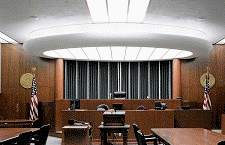

A patent can't enforce itself. If a competitor won't honor a patent, the only way to stop him is in the courts. Or at the border.
I've been litigating patent cases for over 40 years. Both for patent owners and those accused of infringement.
Litigation experience doesn't just win cases. It also adds value to a patent as it's being created. It can make a patent stronger.
While patents and intellectual property have been the focus of my practice, I've handled a wide variety of other litigation as well. Business. Real estate. Oil and gas. Torts. Insurance.
I've also tried a good many federal criminal cases. Several have involved the death penalty. Criminal cases are tried in the same courthouses, before the same judges, and under the same evidence rules as the civil ones. The insights and experience I've gained from this work have been invaluable.
In the criminal law arena, trials are swift and pretrial discovery is limited. I'm convinced that civil cases can and should be managed in much the same way.
These are some of my cases:
- In Wald v. Mudhopper Oilfield Services, Inc., No. 5:04-CV-1693 (W.D. Okla.), I represented the owner of a patent on a drilling fluid additive used in oil and gas wells. A federal jury returned a verdict of willful infringement, and awarded all requested damages. The trial judge later tripled the jury's damage award.
- In Arkie Lures, Inc. v. Gene Larew Tackle, Inc., 113 F.3d 953 (Fed. Cir. 1997), I represented the owner of a patent on a best-selling fishing lure. When a trial judge summarily invalidated the patent, my client appealed. The U.S. Court of Appeals for the Federal Circuit reversed the lower court's ruling, and remanded the case for trial. The parties later agreed on a settlement.
- In Power Lift, Inc, v. Lang Tools, Inc., 774 F.2d 478 (Fed. Cir. 1985), I represented the owner of a patented system for lifting and lowering blowout preventers during oil and gas drilling operations. A federal jury found willful infringement of the patent and awarded money damages. The trial judge later entered an injunction and awarded attorney fees. All of these rulings were upheld on appeal.
- In Cary v. ONEOK, Inc., 940 P.2d 201 (Okla. 1997), I represented a boy who had been badly burned in a gas explosion. He sued a gas utility for negligence. Concerned about how the boy's disfigured appearance might affect the jury, the trial judge banned him from the courtroom. The Oklahoma Supreme Court overturned the boy's exclusion, reversed a jury verdict for the utility, and ordered for a new trial. The parties reached a settlement after remand.
- In United States v. Cronic, 900 F.2d 1511 (10th Cir. 1990), I represented a man charged with multiple counts of mail fraud involving several banks. My client was acquitted by the U.S. Court of Appeals for the Tenth Circuit, resulting in his immediate release from prison. Caroline Kennedy and Ellen Alderman profiled the case in their book, In Our Defense: The Bill of Rights in Action (1990).
- In United States v. West, CR-88-20-W (W.D. Okla.), I handled the retrial of a man charged with first degree murder within Oklahoma's Indian country. A previous trial had resulted in a life sentence. A federal jury returned a verdict of acquittal.






